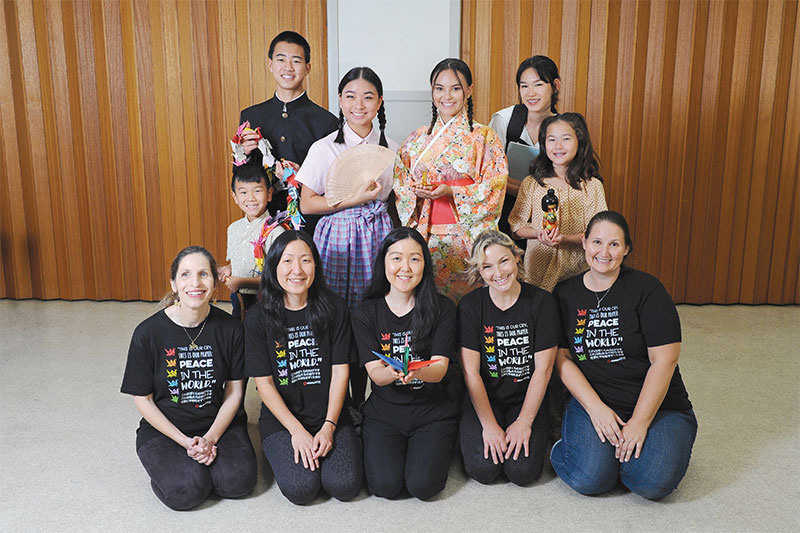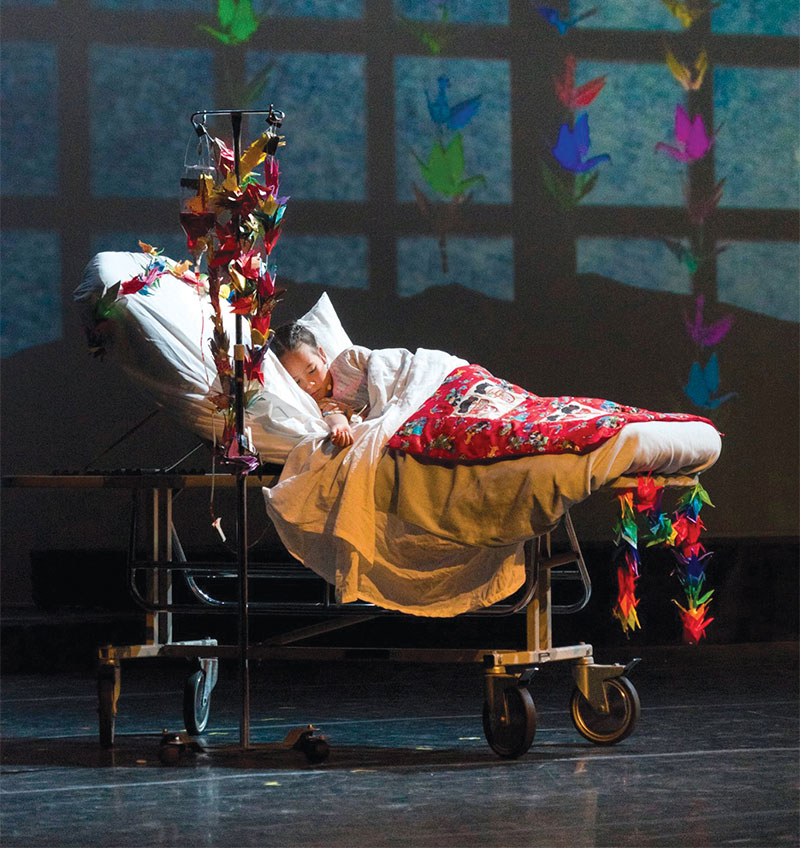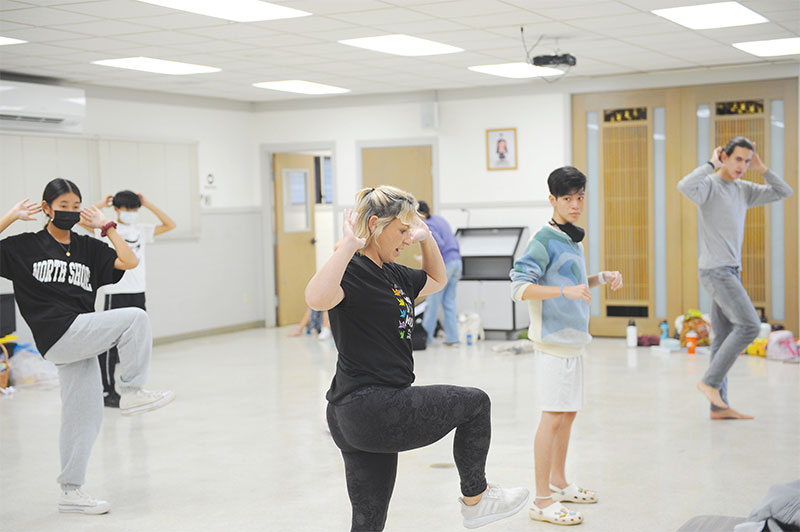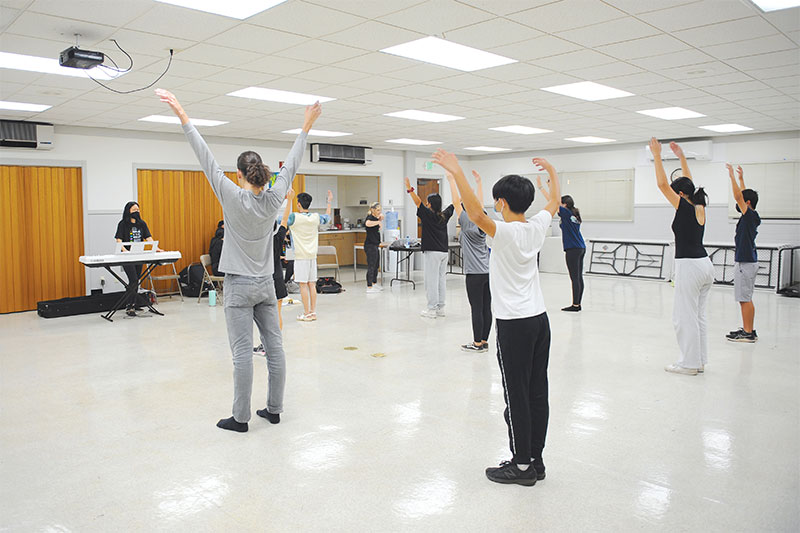Giving peace a chance

(Sitting, from left) Co-writers/composers Laurie Rubin and Jenny Taira, director Carolyn Chung, choreographer Dani Hannah Bensky and costume designer Maile Speetjens. (Standing, from left) Tanner Nakamoto as “Elijah”, Wyatt Tamamoto as “Masahiro”, Jenelle Wong and Emi Sampson as “Sadako,” Madison Mattoon as “Shizuka” and Katie Walthall as “Mitsue.” PHOTO BY LAWRENCE TABUDLO
The ‘Ohana Arts musical “Peace On Your Wings” returns with a powerful message — and this time the cast and crew are taking it to Hiroshima.
When the original musical Peace On Your Wings debuted at Leeward Community College in 2014, it opened to sold-out shows and enthusiastic praise.
With an all-youth cast and a score that included modern pop music and traditional Japanese taiko drumming, it shone a light on a dark period — the aftermath of the United States’ atomic bombing of Hiroshima on Aug. 6, 1945 — as experienced by children.

Masahiro Sasaki hugs actress Shayna Yasunaga after a showing of Peace On Your Wings in 2015. Yasunaga portrayed Masahiro’s sister, Sadako, in the production. PHOTO COURTESY ‘OHANA ARTS
That blast, and the one that hit Nagasaki three days later, is credited with ending World War II. Still, it had devastating consequences for the civilian population.
By focusing the story on children in the post-war 1950s, co-writers/composers Jenny Taira and Laurie Rubin of ‘Ohana Arts were able to connect audiences with their message of peace and ichigo ichie — the Japanese concept of living in the moment.

Paper cranes adorn a children’s hospital in a scene from a 2017 production of Peace On Your Wings. PHOTO COURTESY ‘OHANA ARTS
“Children are the most innocent victims of war,” Taira says. “I think everybody can empathize with and relate to children’s stories. In a way, maybe it’s the best way to tell this kind of story.
“When you have adult characters, there’s baggage. People have more expectations, like, ‘This person is just rich,’ or whatever. People put them in categories. But with kids, they’re just kids.”
Adds Rubin, “Also, there’s just something to be said for the voices of children (singing) … I think people responded to that.”
Peace On Your Wings went on to tour the neighbor islands, then to Los Angeles’ Aratani Theatre (the same place George Takei’s Broadway musical Allegiance made its West Coast premiere) and to New York City’s Gerald W. Lynch Theatre.
The show is now preparing for its debut in Hiroshima in September. It will come on the heels of the 2023 G7 Summit, which also takes place in the southern Japanese city, in May.

Choreographer Dani Hannah Bensky leads the cast of Peace On Your Wings at a rehearsal. LAWRENCE TABUDLO PHOTOS
But first, audiences here in the islands will have a chance to see it again, when it returns to Hawai‘i Theatre, Feb. 9-11.
For those who saw the original, this rendition promises to be a new experience.
“The play starts differently, there’s a couple of songs that we deleted, and we added one new song,” says Rubin. “I think it tells the story more clearly and poignantly.”
Viewers can also expect updated lighting and choreography, and new set designs.

Choreographer Dani Hannah Bensky leads the cast of Peace On Your Wings at a rehearsal. LAWRENCE TABUDLO PHOTOS
Although Rubin and Taira began collaborating shortly after meeting as students at Yale School of Music in 2004 — Rubin is an opera singer and author of the autobiography Do You Dream in Color? about growing up blind; Taira is a composer, pianist and clarinetist — Peace On Your Wings was their first full-scale musical. Many of their adjustments were a result of audience feedback and lessons learned by taking the show on the road.
Since writing it, the pair — who married in 2013 — also went through life changes. They are now parents to a 3-year-old daughter — who has a bit part in the updated play — and 16-month-old twin boys.
“We just started having kids since the pandemic, so we haven’t had a lot of time to write other than these edits,” Taira says. “But I do think that when we’re writing now, we’re thinking, ‘What’s the message we want (our kids) to take away? What kind of world do we want them to be a part of and how do we help them create that world?’”
Peace On Your Wings is still centered around 12-year-old Sadako Sasaki. A real-life victim of the bombing, she was made famous by the children’s book Sadako and the Thousand Paper Cranes by Eleanor Coerr.
When Sadako is diagnosed with leukemia — known at the time as “the atomic bomb disease” — she is determined to fold a thousand paper cranes so that her wish to be cured will come true.
But Rubin and Taira dug deeper, incorporating material from Sadako’s older brother, Masahiro Sasaki, who cowrote The Complete Story of Sadako Sasaki and The Thousand Paper Cranes with American author Sue DiCiccio. It was published in 2018, four years after Taira and Rubin wrote their musical.
Masahiro actually saw the earlier version of their play and praised it, but Taira and Rubin seized the opportunity to refine their work.
“A lot of material that’s out there for kids water down a lot of the emotional content because they think kids can’t handle it,” Rubin says. “But when you think about it, kids undergo so many harrowing experiences. They learn from a very young age what their emotions are, and they can portray that.
“These (changes) don’t make her story any sadder, by the way,” she continues. “They just make it really poignant and actually more uplifting.”
Adds Taira, “(Sadako) was so full of life and had such a will to live, this illness was not going to stop her. She was just one of these people who never took a day she was alive for granted.
“She did whatever she could to make the most of every single day without knowing, necessarily, ichigo ichie but just living that.”
Emi Sampson and Jenelle Wong, both juniors at Kalani High School, were cast for the lead role of Sadako. (Taira and Rubin chose two actresses in case one of them came down with COVID-19.) Wyatt Tamamoto, a junior at ‘Iolani School, will be Masahiro, and Maya Nakamoto, an eighth grader at Hawai‘i Technical Academy, will play Aiko, a fictional friend of Sadako’s.
When they and the rest of the cast go to Hiroshima, they will visit the Children’s Peace Monument, which commemorates Sadako and other child victims of the atomic bombing, and the Hiroshima Peace Memorial Museum, which is dedicated to documenting the blast.
Taira first visited the museum in the early 2000s.
“It was very eye-opening,” she says. “I had read the book Hiroshima (by John Hersey) back in high school. But it’s one thing to read about it and another to actually go there and see the artifacts and read the stories told by people who were there. It stuck in my memory and that’s a big reason I thought of this story to tell.”
The cast also plans to meet with Sadako’s surviving friends and tour Nobori-cho Elementary School, which Sadako attended.
As for the show itself, Taira and Rubin say bringing it to Hiroshima feels like a homecoming of sorts.
“We are nervous to see how the Hiroshima people are going to react,” Taira says. “But I think just bringing this from the U.S., it’s a beautiful thing. Hopefully on the Japan side, they will feel there is some recognition that we are telling her story, and they know we share this wish for peace. We’re on board for there to be peace in this world.”
Learn more at ohanaarts.org. To purchase tickets, visit hawaiitheatre.com.







